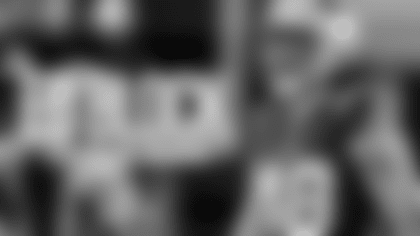[wysifield-embeddedaudio|eid="495706"|type="embeddedaudio"|view_mode="full"]Q: How much of a factor was your planned usage of James White and James Develin in deciding to make Dion Lewis inactive for last night's game?
BB: Well, you know we have to inactivate seven players so we can always talk about the ones that weren't active. Could they have been active? We had a lot of healthy guys. If we would've been able to activate a lot of them, out of those seven we probably would've played most of them. Every week we have to take the players that we feel are the best for that game and that takes everything into consideration, which is a very long list of things to consider and in the end we take the 46 players that we feel will give us the best chance for that game on that day. It's the way it'll be every week. Guys that are injured that can't play, that's not a conversation. So they're obviously on the list. The other players – that's the discussion.
Q: Was health at all a factor in Dion Lewis not being active last night?
BB: What do you mean was it a factor?
Q: Was he fully ready to go?
BB: Well he wouldn't have been on the injury report. I mean we didn't activate him until Saturday but he wouldn't have been on the injury report. I mean when a player hasn't played for a year then they haven't played for a year.
Q: How would you assess the play from your cornerbacks last night?
BB: I think there's room for improvement in every area. As I said after the game we can do a lot of things, need to do things better than we did them all the way across the board; coaching, playing, every unit. There are some things in every unit that were good and there were some things that we need to try and work on.
Q: Would a more aggressive defensive scheme perhaps help create more turnovers or is it simply a matter of being patient and capitalizing on an opponent's mistakes?
BB: Well, I think it's both. I mean you're always looking to capitalize on mistakes and you're always looking to create, to try and create those types of plays when you get the opportunity to do it. So when we have those opportunities we need to take advantage of them.
Q: Do you feel that the team would benefit defensively by being more aggressive and trying to create some of those turnovers?
BB: I mean I don't know. What does that mean?
Q: Is there something more you can ask of your pass rush players or things in the secondary that could be considered more aggressive in order to try and get some more turnovers?
BB: I mean look, we're trying to do everything we can in all of those situations that you just brought up. We try to play as competitively as we can. I'm not really sure what you're talking about with the pass rush. I'd say last night we had a lot of free guys running at the quarterback.
Q: Having now looked at the film, what did you see from your team and from Seattle on that final offensive series down on the goal line?
BB: Yeah, I mean we've just got to do a little better job in that situation. I mean that's obvious.
Q: What goes into the decision to go heavier down on the goal line with players such as James Develin and Cameron Fleming as opposed to other times spreading the formation out a bit?
BB: I mean that's part of the game planning of every week and really every play, every situation, first, second, and third-down, goal line, red area – I mean you name it – where you feel like you can gain an advantage. Maybe it's something that you can force them into or how they play a certain type of look or formation or whatever it is and now you can attack it. That goes on for every play throughout the course of the game; not just on the goal line. You've seen us play plenty. We have spread formations. We have tight formations. We have two backs in the backfield, one back in the backfield, no backs in the backfield. I mean whatever we do on any of those is to try to create some type of advantage in some way for the play that we have. What goes into it is the game planning and the matchups that occur every week and try to find the best ones.
Q: As a coach how do you draw the line between determining that if you stick with something it will prevail versus saying 'Look, we're just banging our head against the wall here?'
BB: Yeah, well that's definitely what you need to decide. No question about it. You have to decide whether you want to, like you said, just do it again and kind of get it right or do something else. That's exactly what it comes down to. Maybe it's everything went right but one thing was wrong. You can correct that, you have it. Maybe you just look at it and say 'This isn't really what we want.'
Q: Can you speak to the value of giving a young player like Cyrus Jones the opportunity to watch several games from the sideline while he was inactive and not give up on him if he had a tough game or two? How important is that for a player's long term development?
BB: Well, right now we're not really thinking too much long term. We were thinking about trying to beat Seattle and this week we're thinking about trying to beat San Francisco. That's really what drives those decisions. We're not really thinking about 2019 or something like that right at this moment. Every day every player has an opportunity here to get better, to improve in their understanding in the meetings and learn information about their position or their technique or what the opponents are going to do and then every day we practice they have an opportunity to work on those things competitively in practice from individual drills to team drills and so forth. [It is] based on all of that if a player gets an opportunity in a game that he's earned, that he's gotten in his preparation and performance in practice or prior game performances. It could be due to injuries. However it comes up then we evaluate that player's performance in the game when he gets that. Again, it can be something that's earned which is really what it really is but there are times when players play because of circumstance. Although they've earned the opportunity to be in position to play in that circumstance then we evaluate them. It doesn't necessarily stay the same. It hopefully gets better but we just have to evaluate those performing opportunities and it's up to each individual player to take advantage of those opportunities and do the most with them that he can. That's going to determine his role, his playing time, his future opportunities.
Q: What did you see on Kam Chancellor's hit on Tom Brady in the third quarter?
BB: I saw the same thing everybody else saw.
Q: Did you think it was a dirty hit or did he just lose his balance?
BB: Yeah, you know on a football field it's hard to judge intent. I don't think the officials can judge intent. I think that's too difficult. They're taught to judge what they see and call what they see so that's their job. They made a lot of calls last night. We had some that favored us. We had some that didn't but that's their job and really I'm focused on our job which is to prepare to play better than we played last night.
Q: What makes it particularly difficult for defensive backs to communicate mid-play as receivers are coming in and out of their zones and what type of challenge is that for a secondary?
BB: Well, I'd say post-snap communication after the ball is snapped – I don't think you can ever count on that communication. Maybe occasionally you can get it, but look, all of our games are sold out. That's no secret. So for us to think that we're going to be able to communicate and talk in the middle of the defensive play I don't think is realistic any more than we'd be able to have much communication offensively when we're on the road. That's another thing I don't think you can count on, especially after the snap. It's hard enough before the snap but after the snap if you're going to say something and somebody five yards away is going to actually hear it when you're dealing with a lot of crowd noise – I don't think you can coach that way. If you're banking on that then there's going to be times when you're not going to have it. If you get it, great, but you can't count on that. Therefore you have to be able to visually see it and recognize it collectively so that we all see the same thing, we all react the same way and everything gets handled properly based on visual recognition. Maybe there's one particular key to how it's going to unfold, whether that's a blitz pickup on offense or if they cross players or things like that, or defensively the same thing if you're dealing with a group of receivers in close proximity how that's going to be handled. Again, we could make a call before the ball is snapped. That's certainly doable, or signal a call, but after the snap that communications got to be visual. Really it's a silent communication that we all have to have but I don't think you can verbally count on it so we don't.





































